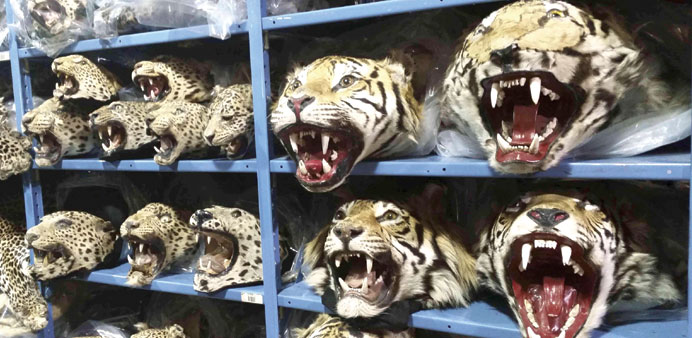Stuffed heads of tigers, leopards and other big cats are seen on the shelves of the US Fish and Wildlife Service (USFWS) National Wildlife Property Repository in Denver, Colorado in a picture provided by the USFWS.
Tribune News Service/Washington
A 115-year-old US law that’s grown like kudzu now hangs over the head of the Minnesota dentist who shot Cecil the lion.
But it’s one of the Supreme Court’s newest decisions that could shape how officials may handle angry members of the public who have raged against the bow-and-arrow wielding dentist, Dr Walter Palmer.
Now both hunter and hunted, Palmer has ventured into a legal thicket that’s almost certainly darker than he ever could have imagined. It’s also getting thicker by the day, as lawmakers take aim on their own.
“Let’s not be cowardly lions when it comes to trophy killings,” Sen. Bob Menendez said on Friday as he introduced legislation inspired by Cecil’s death.
Menendez dubbed his new bill the Conserving Ecosystems by Ceasing the Importation of Large (CECIL) Animal Trophies Act. Menendez, who is facing trial on corruption charges, was the first member of Congress to thrust himself into the Cecil story line.
Menendez’s bill, even if it becomes law, won’t directly affect Palmer. Other laws, both foreign and domestic, might.
Investigators in both Zimbabwe and the US want to talk to Palmer in connection with the shooting of Cecil in early July. Reportedly, Palmer and his guides lured Cecil from the protected confines of Hwange National Park. First shot by an arrow, Cecil was later tracked, finished off with a rifle and beheaded.
US Fish and Wildlife Service officials are taking the lead in the US, guided by a law first passed in 1900 commonly called the Lacey Act. On Friday afternoon, officials revealed via Twitter that they had been “voluntarily” contacted late Thursday “by a rep” of Palmer.
“That investigation will take us wherever the facts lead,” Edward Grace, the agency’s deputy chief of law enforcement, said Thursday.
Named for an Iowa congressman and staunch conservationist, John F. Lacey, the much-amended law now spans some 11 pages of the US Code and covers much more territory than originally envisioned.
Briefly, the Lacey Act makes it “unlawful to import, export, sell, acquire, or purchase” wildlife taken in violation of US, state or foreign laws. A felony conviction can result in a fine of up to $250,000 and a prison sentence of up to five years.
“When the Lacey Act was first passed, it was essentially designed to deal with interstate poaching,” Paul Larkin, a senior legal research fellow at the conservative Heritage Foundation, noted in an interview. “It was only over time that Congress began to add in violations of a foreign law.”
The prosecutorial emphasis is often on explicitly commercial operations.
Palmer said in a statement issued on Tuesday that he relied on professional guides and believed all the necessary permits were in hand.
Page Pate, an Atlanta-based defence attorney who has handled Lacey Act cases, noted in an interview on Friday that though the law is pinned to importation or trafficking, prosecutors could conceivably argue that it also covers “conduct that you think is going to happen,” such as conceiving a plan to ship an animal trophy.
“It would not be an easy case to make,” Pate said.
A different legal question arises from the furious reactions to Palmer’s killing of Cecil. Online postings collected by the BuzzFeed news site included a number that sounded like threats.
One man, for instance, declared that “I’d put a cross bow bolt through Walter Palmer then track him from 40 hrs, shoot him, behead him, skin him and sleep peacefully.”
It sounds horrific. But under a Supreme Court decision issued last June, in a case arising out of graphic Facebook postings, conviction on a charge of making a threatening communication requires that the defendant actively intends a threat or knows his or her words will be seen as threatening.

